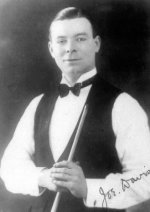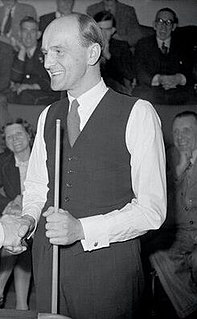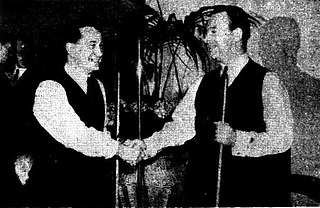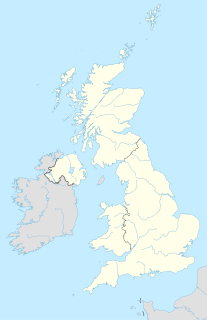
The World Snooker Championship is professional snooker's longest-running, most prestigious, and wealthiest tournament, with total prize money in 2021 of £2,395,000, including £500,000 for the winner. First held in 1927, it is now one of the three tournaments that make up snooker's Triple Crown Series. The reigning world champion is Mark Selby.

Joseph Davis was an English professional snooker and English billiards player. He was the dominant figure in snooker from the 1920s to the 1950s and has been credited with inventing aspects of the way the game is now played, such as break-building. With equipment manufacturer Bill Camkin, he drove the creation of the World Snooker Championship by persuading the Billiards Association and Control Council to recognise an official professional snooker championship in 1927. Davis won the first 15 championships from 1927 to 1946 and remains the only undefeated player in World Snooker Championship history. He scored the championship's first century break, in 1930.

Herbert John Pulman was an English professional snooker player who was the World Snooker Champion from 1957 to 1968. He won the title at the 1957 Championship, and retained it across seven challenges from 1964 to 1968, three of them against Fred Davis and two against Rex Williams. When the tournament reverted to a knockout event in 1969 he lost 18–25 in the first round to the eventual champion John Spencer, and he was runner-up to Ray Reardon in 1970. He never reached the final again, although he was a losing semi-finalist in 1977.
Desmond Rex Williams is a retired English professional snooker and billiards player. He was the second player to make an official maximum break, achieving this in an exhibition match in December 1965. Williams won the World Professional Billiards Championship from Clark McConachy in 1968, the first time that the title had been contested since 1951. Williams retained the title in several challenge matches in the 1970s, and, after losing it to Fred Davis in 1980, regained it from 1982 to 1983.

Walter Weir Wilson Donaldson was a Scottish professional snooker and billiards player. He won the World Snooker Championship in 1947 and 1950, as well as finishing as runner-up to Fred Davis six times as the pair contested eight consecutive world finals from 1947 to 1954.

Horace Lindrum was an Australian professional snooker and billiards player. A dominant snooker player in Australia, he lived in Britain for long periods and played in the major British tournaments. From his arrival in Britain in 1935 he was regarded as the second best player in the world, behind Joe Davis. Lindrum contested three World Championship finals against Davis, in 1936, 1937 and 1946, losing all three to Davis but coming close to beating him on several occasions. Lindrum won the 1952 World Championship which, because of a dispute between the governing body and the players' association, was only contested by himself and New Zealander Clark McConachy.

The 1927 World Snooker Championship was a snooker tournament held at various venues from 29 November 1926 to 12 May 1927. At the time, it was called the Professional Championship of Snooker but it is now recognised as the inaugural edition of the World Snooker Championship. The impetus for the championship came from professional English billiards player Joe Davis and billiard hall manager Bill Camkin, who had both observed the growing popularity of snooker, and proposed the event to the Billiards Association and Control Council. There were ten players who entered the competition, including most of the leading billiards players. The two matches in the preliminary round were held at Thurston's Hall in London, and the semi-finals final took place at Camkin's Hall in Birmingham. Venues for the quarter-finals were determined by the players involved, resulting in one match being held at Thurston's Hall, one at Camkin's Hall, and one each in Nottingham and Liverpool.
Since 1927 the World Snooker Championship had been played as a single-elimination tournament, but between 1964 and 1968, it was defended over seven challenge matches. Following a hiatus after the 1957 World Professional Match-play Championship, the event was revived by Rex Williams on a challenge basis, with the champion being opposed by prominent players. This began in 1964, organised by the Billiards Association and Control Council. The 1957 champion John Pulman contested and won all seven challenge matches against various opponents in the next five years, until the tournament reverted to a knock-out format in 1969.

Tom Reece was an English professional player of English billiards. He was six times runner-up in the professional billiards championship, now regarded as the world championship, losing three times to Melbourne Inman in finals from 1912 to 1914, and three times to Tom Newman in the 1921, 1924 and 1925 finals. He made the unofficial world's highest billiards break of 499,135 in 1907 using a cradle cannon technique shortly before it was banned from the sport. In 1927, his prowess with the pendulum stroke led to that also being banned from use in competition.
The News of the World Snooker Tournament was one of the leading professional tournaments of the 1950s and widely considered as being more important than the world championship due to the involvement of Joe Davis. The event was sponsored by the Sunday newspaper News of the World. The highest break of the tournament was four times 140 or more, which was unusual at that time.
The English Amateur Championship is an annual snooker competition played in England and is the highest ranking and most prestigious amateur event in England. It is the oldest and longest-lasting snooker tournament in the world having been established back in 1916, 11 years before the World Snooker Championship.
The 1936 World Snooker Championship was a snooker tournament that was held at the Burroughes and Thurston's Halls in London, England from 23 March to 2 May 1936. There were 13 entries; a significant increase from the five in the previous year and just two in 1934. Defending champion Joe Davis won the Championship for the tenth consecutive time, defeating Horace Lindrum in the final 34–27. Horace Lindrum became the first Australian to compete at the World Championship and made the only century break of the tourament, a 101 in his semi-final match against Stanley Newman.
The Daily Mail Gold Cup was an important professional cue sports tournament from 1935 to 1940. In the first two tournaments it was contested as a billiards event before becoming a snooker event. It was sponsored by the Daily Mail. The tournament was suspended following the 1939/40 event and not played again. The concept of a handicap snooker tournament was revived for the 1948 Sunday Empire News Tournament.
The 1936 Daily Mail Gold Cup was a professional snooker tournament sponsored by the Daily Mail. Despite giving a handicap to all the other players, the cup was won by Joe Davis who won all his five matches. The Australian Horace Lindrum finished in second place in the final table. It was the third Daily Mail Gold Cup tournament, although the first two had been billiards events. The Daily Mail Gold Cup ran from 1935 to 1940.

Thurston's Hall was a major billiards and snooker venue between 1901 and 1955 in Leicester Square, London. The hall was in the premises of Thurston & Co. Ltd which relocated to Leicester Square in 1901. The building was bombed in 1940 and reopened under a new name, Leicester Square Hall, and new management in 1947. The venue closed in 1955 and the building was demolished to make way for an extension to Fanum House. The Hall was used for many important billiards and snooker matches, including 12 World Snooker Championship finals between 1930 and 1953. It was also the venue of the first World Snooker Championship match in November 1926. The hall was sometimes referred to as "Thurston's Grand Hall". There was also a "Minor Hall" in the same building.
The 1959 News of the World Snooker Plus Tournament was a professional snooker tournament sponsored by the News of the World. The event was played under the Snooker Plus rules, a variant of snooker with two additional colours. The tournament was won by Joe Davis with Fred Davis finishing in second place. It was the eleventh and final News of the World Tournament, which ran from 1949/50 to 1959.
The 1958 News of the World Snooker Tournament was a professional snooker tournament sponsored by the News of the World. The tournament was won by Fred Davis who won 7 of his 9 matches, beating his brother Joe in all their three matches. Joe won 5 matches and finished in second place ahead of John Pulman by winning more frames overall. The News of the World Snooker Tournament ran from 1949/50 to 1959.
Burroughes Hall was an important billiards and snooker venue in Soho Square, London from 1903 until it closed in 1967. The hall was in the premises of Burroughes & Watts Ltd., who had been at 19 Soho Square since 1836. Burroughes & Watts opened a new billiards saloon in 1903, known as the Soho Square Saloon. This was re-opened as the Soho Square Hall in 1904 and was renamed Burroughes Hall in 1913. In 1967, control of Burroughes & Watts Ltd. was taken over by a group of property developers. The assets included 19 Soho Square, which was demolished and replaced by a modern office block.
The Women's Professional Billiards Championship was an English billiards tournament run by Burroughes and Watts in 1930, and from 1931 to 1950 by the Women's Billiards Association. Joyce Gardner won the tournament on seven of the fourteen times that it was held.
The Billiards and Snooker Control Council (B&SCC) was the governing body of the games of English billiards and snooker and organised professional and amateur championships in both sports. It was formed in 1919 by the union of the Billiards Association and the Billiards Control Club.







